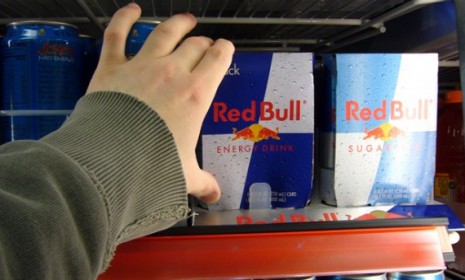Does Red Bull give you tooth decay?
Roughly 30 to 50 percent of American teens consume energy drinks like Red Bull or Monster regularly, which might be having disastrous effects on their teeth

A free daily email with the biggest news stories of the day – and the best features from TheWeek.com
You are now subscribed
Your newsletter sign-up was successful
The creators of Red Bull claim the energy drink can give you wings, but what does the sugary, caffeinated beverage do to your teeth? A new study comparing energy drinks to sports drinks like Gatorade finds that the high levels of acidity in the former can wreak havoc on a healthy set of pearly whites. Here's what you should know:
Why focus on energy drinks?
"Young adults consume these drinks assuming that they will improve their sports performance and energy levels, and that they are 'better' for them than soda," Poonam Jain, lead author of the study, tells ABC News. Yet, most unknowing consumers are shocked when they learn the drinks "are essentially bathing their teeth in acid." About 30 to 50 percent of American teens consume energy drinks like Red Bull or Monster regularly, and up to 62 percent drink sports drinks like Gatorade or Powerade once a day.
The Week
Escape your echo chamber. Get the facts behind the news, plus analysis from multiple perspectives.

Sign up for The Week's Free Newsletters
From our morning news briefing to a weekly Good News Newsletter, get the best of The Week delivered directly to your inbox.
From our morning news briefing to a weekly Good News Newsletter, get the best of The Week delivered directly to your inbox.
How did researchers test for tooth decay?
Examining 13 different sports drinks and nine energy drinks, the team collected data about pH levels, fluoride, and "titratable acid" — a term that describes acids such as phosphoric and sulfuric acid — by submerging teeth samples in the beverages for 15 minutes. Afterward, researchers immersed the enamel in saliva for two hours, repeating the process four times a day for five days.
What did they learn?
All the drinks eroded tooth enamel, but energy drinks ate into the enamel at twice the speed. Typically, bacteria in the mouth converts the sugar from drinks into acid, which in turn damages the teeth, says Dr. David Katz of the Yale Prevention Center. Energy drinks, which already have a "high acid load," are essentially "cutting out the middleman on the way to tooth decay." This is especially problematic since companies do not have to disclose things like acidity levels on nutrition labels.
A free daily email with the biggest news stories of the day – and the best features from TheWeek.com
What do drink manufacturers say?
The American Beverage Association has, not surprisingly, defended the beverages, calling the research flawed. "This study was not conducted on humans and in no way mirrors reality," said the association in a statement. "People do not keep any kind of liquid in their mouths for 15 minute intervals over five day periods." Jain argues that the drinks cause more than just tooth decay. Too much citric acid, for example, can cause kidney stones and a loss of bone mass. The larger issue, she says, is about making healthier choices: "This has become a big concern because people are drinking more of these drinks and less milk," and that doesn't do a body good.
-
 Samurai: a ‘blockbuster’ display of Japanese heritage
Samurai: a ‘blockbuster’ display of Japanese heritageThe Week Recommends British Museum show offers a ‘scintillating journey’ through ‘a world of gore, power and artistic beauty’
-
 BMW iX3: a ‘revolution’ for the German car brand
BMW iX3: a ‘revolution’ for the German car brandThe Week Recommends The electric SUV promises a ‘great balance between ride comfort and driving fun’
-
 Munich Security Conference: a showdown between Europe and Trump?
Munich Security Conference: a showdown between Europe and Trump?Today’s Big Question Report suggests European leaders believe they can no longer rely on the US for military support – but decoupling is easier said than done